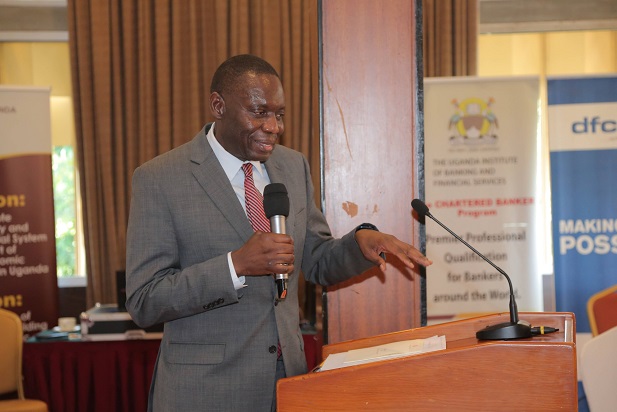Michael Atingi-Ego, the Bank of Uganda (BoU) Deputy Governor
The Bank of Uganda (BoU) Deputy Governor, Michael Atingi-Ego, has urged Ugandans to save with regulated financial institutions, noting that they (regulated financial service providers) ensure the security of customer savings and help to preserve value by paying interest on the deposits.
“Saving money without earning a reasonable return, e.g., in a pot or under a mattress, is unwise because the amount stays fixed while the prices of goods and services typically keep increasing year in and year out. And if we accept that “money is what money does”, the money in a pot does less and less as time goes by,” Atingi-Ego said.
He made the remarks during the World Savings Day Press Conference held at Sheraton Hotel Kampala on Tuesday 31st October 2023. This year, Uganda celebrates World Savings Day under the theme, “Personal Financial Wellness – Live it.”
In his Keynote Address, Atingi-Ego said the only way to preserve and grow the value of your money is to earn a return greater than inflation.
“To do this, save your money in formal and regulated financial institutions, such as commercial banks, credit institutions, and microfinance deposit-taking institutions, which the Bank of Uganda regulates,” he said.
He said saving can transform lives.
“With your indulgence, let me share a story I picked from the Care International website about a phenomenal single mother called Angrace from north-eastern Uganda dated 17 July 2008,” he said.
Angrace’s life took a remarkable turn when she joined a Village Savings and Loans Association (VSLA) and began saving regularly with her group. In 2007, she took a loan of 30,000 shillings to invest in her farming activities. She purchased cassava stems and hired labour to harvest her crops. With a bountiful harvest, she sold cassava flour, which enabled her to pay for her children’s education and repay the loan with interest.
Following her successful experience, Angrace obtained another loan of 150,000 shillings, which she used to purchase a cow and establish a small pancake-making business. Her pancake enterprise added value to her farming output and boosted her income significantly. At the time of the story (2008), she could make up to 40,000 shillings a day by selling cassava and wheat flour pancakes. Her flourishing business allowed her to repay her loans, buy two more cows, and acquire five goats.
Angrace saved 5,000 shillings a week, which she utilised to support her children’s education and purchase books. Her next aspiration was to purchase a bicycle costing 120,000 shillings for transport to the market.
The BoU boss said Angrace’s story is but one of many in Uganda, where lives have been transformed through access to financial services.
He noted that digitalisation is making saving and accessing other financial services increasingly available to everyone through various formal tools tailored to different categories of users.
“Digital technology, such as mobile phones and other devices, is solving the issue of efficiently accessing the unbanked population, who often lack access to physical bank branches in remote areas. Accordingly, the BoU collaborates with stakeholders such as payment service providers and operators, FinTechs, regulators like the Uganda Communications Commission, and development partners to innovate and expand digital financial services, products, and phone and internet connectivity nationwide,” he said.
He added: “We at the BoU urge the public to keep their money in the digital financial system. After saving your cash in financial institutions through various means, including mobile money, we encourage you not to withdraw (or “cash-out”) your money but keep earning interest on your digital accounts, executing payments, and accessing micro-credit and micro-insurance services. Digitalisation offers the most effective means of providing financial services to all Ugandans, many outside the money economy.”
According to the Financial Capability Survey conducted by BoU in 2020, approximately 50% of Ugandans saved money. Of those who saved, 40% did so for immediate consumption, while only 20% saved towards specific life goals, such as owning a house.
World Savings Day is observed annually on 31st October, since 1924, to educate people worldwide about the importance of saving their money in regulated financial institutions rather than keeping it hidden away or in savings boxes. Uganda joined this global celebration in 2016.






